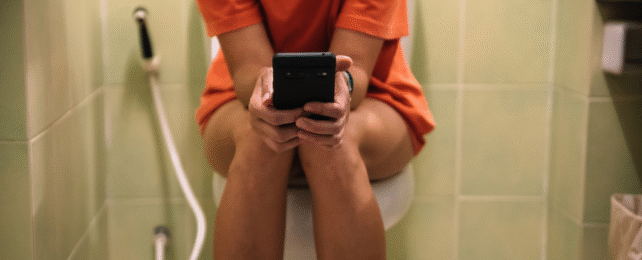Reading on the toilet is something many people do, but the time-sucking powers of smartphones may have us sitting on the ceramic stool for an unhealthy amount of time.
A new study has found that those who use their phones on the toilet face a 46 percent increased risk for hemorrhoids – swollen veins in the lower rectum, thought to be caused by too much pressure.
A participant's age, sex, body mass, exercise, or fiber intake did not have an impact on the results.
Related: Your Poop Schedule Says a Lot About Your Overall Health, Suggests Study
"We're still uncovering the many ways smartphones and our modern way of life impact our health," says senior author and gastroenterologist Trisha Satya Pasricha of the Beth Israel Deaconess Medical Center in Boston.
"It's possible that how and where we use them – such as while in the bathroom – can have unintended consequences."
Pasricha and a team of researchers in the US surveyed 125 participants who were receiving a colonoscopy. More than 40 percent had a hemorrhoid, and 93 percent said they used their phone on the toilet at least once a week.
About half that group said they read news on the toilet, whereas about 44 percent said they were on social media, and about 30 percent were emailing or texting.
Some of the respondents said they spent more than 6 minutes on the toilet, per visit, and many said they believed they were on the toilet longer because of their smartphones.

"This study adds to a growing body of research showing how smartphones have infiltrated even the most private corners of our lives and bodies," says digital well-being scientist Alex Beattie from Victoria University of Wellington in NZ, who was not involved in the research.
"We already know that screen time before bed can disrupt sleep, and that phones at the dinner table can interfere with family connection. Now, it seems, our bathroom habits aren't safe either."
A small survey like this one can only show correlations and possible risk factors. Whether or not reading on the toilet actually predisposes someone to hemorrhoids needs further research.
In the United States, nearly 4 million doctor and emergency department visits annually are due to hemorrhoids, and yet the condition is poorly understood and tracked. At this point, we only have hypotheses as to how it occurs.
In fact, the only US national survey on hemorrhoids was conducted in 1989. No newer data exists at this level.
Hemorrhoids are clusters of blood vessels, smooth muscle, and connective tissue in and around the lower rectum, and while everyone has these cushions, which are thought to make pooping easier, when the tissues swell or bleed, they are known colloquially as hemorrhoids.
While there are probably a variety of factors that lead to hemorrhoids, scientists generally think they are caused by overstraining, extended defecation time, or frequent bowel movements.
Some studies suggest, for instance, that prolonged sitting may be a contributing factor, possibly because sitting on the toilet weakens and dilates blood vessels in and around the anus and rectum.
As a result, some doctors advise that we spend no more than 10 minutes on the john. But other experts suggest spending no more than 3 minutes.
This latter recommendation is based on a study of 100 patients with confirmed hemorrhoids, who spent more time reading on the toilet than their age- and sex-matched counterparts without hemorrhoids.
Reading on the toilet is hardly a modern phenomenon. In colonial times, it is said that people used to wipe their butts with newspapers because that is what they had on hand.
But phones are attention-suckers on a whole other scale, and there's a chance that their use on the toilet is distracting us from the task at hand.
In light of this possible risk factor, some health experts have warned that 'toilet scrolling' may be messing with our 'toilet hygiene'.
"We need to study this further," Pasricha says, "but it's a safe suggestion to leave the smartphone outside the bathroom when you need to have a bowel movement."
Until we know more, the takeaway seems to be: Keep your time on the toilet limited. Going number two should be your number one priority – not scrolling on your phone.
The study has been published in PLOS One.
This article has been updated from an earlier version published in May 2025.
